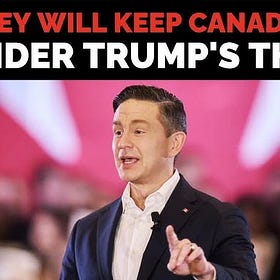Pierre Poilievre’s Precarious Predicament
How Poilievre's Riding Defeat Has Set the Stage for a Tory Reckoning
Pierre Poilievre probably never imagined he'd be watching Parliament on CPAC from his living room during the next session of Parliament. But after losing Carleton—his home turf for two decades—he's become an opposition leader without a stage [1].
The last time a leader faced such humiliation, Mackenzie King, after losing his seat in the 1925 federal election, continued leading the Liberal Party by observing and directing proceedings from the gallery until he secured a seat in a subsequent by-election.
Unlike King, however, Poilievre’s ability to exert influence from outside Parliament is severely limited in today’s tightly structured parliamentary system, leaving him even more sidelined and politically vulnerable [2].
Timing is everything
The earliest Poilievre could realistically return to the House of Commons is in the autumn of 2025—assuming a by-election is called swiftly and he wins it.

According to the Canada Elections Act, once a seat is declared vacant by a member’s resignation, the Speaker must inform the Chief Electoral Officer, triggering the process to call a by-election. While Prime Minister Carney has some discretion in setting the date, the legislation requires that a by-election writ be issued no later than 180 days after the vacancy is officially recognized.
This means Carney cannot delay indefinitely. However, depending on how quickly this process unfolds and whether Poilievre secures a nomination and win, he may still end up missing the entire 2025 parliamentary session. This delay further weakens his ability to contest the legislative agenda or shape national debate in the short term.
SIDEBAR: Potential “Safe Seats” for Poilievre’s Return – If an MP steps aside, where might Poilievre run?
The criteria are clear: a rock-solid Conservative riding (to minimize any risk of a second embarrassing loss), an MP loyal enough to fall on their sword, and preferably a seat that isn’t too remote or rural, to avoid the impression Poilievre is retreating to a fortress far from the urban battlegrounds. Some likely contenders include:Algonquin—Renfrew—Pembroke (Ontario) – Formerly known as Renfrew—Nipissing—Pembroke, this rural Ontario stronghold near Ottawa was again won by the Conservatives by a landslide margin in 2025. Longtime MP Cheryl Gallant is a die-hard partisan and Poilievre ally; if persuaded to retire, this seat would offer Poilievre a quick path back to the House with minimal risk. Its proximity to Ottawa would allow him to maintain a local base near the capital.
Fort McMurray—Cold Lake (Alberta) – Deep in Alberta’s oil patch, this riding routinely delivers Soviet-era Conservative majorities. Any Tory MP here would be sitting on tens of thousands of excess votes that Poilievre could easily inherit. The downside: it’s far from Ottawa and utterly rural, which could underscore the Conservative “base-only” image he may want to shed.
Selkirk—Interlake—Eastman (Manitoba) – A safe Prairie seat held by veteran MP James Bezan, who is known to be loyal to the party. If Bezan or a similar stalwart were willing to step aside, Poilievre could run in a region that’s safely Conservative but geographically more central. It offers a balance: rural enough to be secure, but not as distant as Alberta.
Calgary Heritage (Alberta) – Formerly Stephen Harper’s riding, this urban Calgary seat is as safe as they come (the Conservatives captured over 65% of the vote here in 2025). Its current MP, Shuv Majumdar, is a first-termer and strong Poilievre supporter who might defer to the greater good. Running in a major city like Calgary would show Poilievre isn’t afraid of an urban electorate, while virtually guaranteeing a win given the party’s dominance in Alberta.
A Performer Without a Stage
When Mark Carney's Liberals eventually take their seats as Parliament resumes, Poilievre’s predicament will deeply hamper his political style.
Known as a consummate parliamentary performer, Poilievre has thrived in confrontational exchanges and viral sound bites, which were meticulously edited and repurposed for high-engagement content across platforms like X (formerly Twitter) and YouTube.
These exchanges from Question Period and other parliamentary interactions are central to feeding content into Poilievre’s digital strategy. Now, he'll have to make do without direct engagement, deprived of the critical platform of Question Period to challenge the Prime Minister and government directly.
Views, Rage, Repeat: How the Conservative Party Became a Media Powerhouse
Have you ever found yourself arguing with a Conservative online and felt like they were living in an alternate universe? Like no matter how many facts you offer, it’s as if you’re speaking entirely different languages? That’s not a coincidence. It’s by design.
Without an official seat, he's excluded from official debates and key parliamentary interactions, severely disrupting a key part of his media and outreach workflow [2].
Carney’s Golden Opportunity
This absence presents Carney's Liberal government a rare advantage to swiftly set their legislative agenda. Though Carney doesn't command a full majority—he holds 169 seats in a 343-seat House, just shy of the 172 seats required—he’s close enough to potentially govern with minimal support.
With pressing threats from the U.S.—notably Trump’s "51st state" rhetoric and escalating tariffs—Carney's government can proactively introduce legislation that neutralizes Conservative talking points, particularly on crime, gun control, and carbon pricing.
This approach would likely have the same effect as it did during the Campaign with the consumer carbon tax, allowing Carney to shut down long-held Conservative criticisms and move the agenda forward unopposed.
Unlike mere campaign promises, these actions could reshape Canada's political landscape well before Poilievre even returns to the House. Additionally, Carney, who proved more than effective at directly challenging Poilievre during the election, will now find it significantly easier to control the political narrative.
Without Poilievre present, any criticisms or responses directed toward the Conservative leader will have to be awkwardly handled by proxies, effectively making the task of dismantling Conservative arguments akin to shooting fish in a barrel [3].
Financial Constraints and National Outreach
Without a seat in the House, Poilievre also loses access to discretionary parliamentary spending typically available to MPs for travel and constituency engagement.
Members of Parliament receive specific allowances for official business, including covering travel expenses critical for national visibility and maintaining party support.
With these resources now unavailable to him, Poilievre faces the stark choice of either significantly reducing his extensive travels across Canada or relying entirely on direct funding from the Conservative Party. This financial complication not only amplifies the logistical burden but also risks damaging optics, portraying Poilievre as overly dependent on partisan finances, further challenging his efforts to maintain a credible national presence without parliamentary backing.
The Security Clearance Blindspot
Poilievre’s past decision to refuse top-secret security clearance, which he once touted as principled defiance, now significantly diminishes his strategic influence.
Without clearance or even MP status, he's entirely shut out from crucial intelligence briefings on national security and foreign policy.
Consequently, he’s effectively sidelined, unable to credibly critique or engage on these pivotal issues, particularly disadvantaging him during international crises or sensitive national matters, further diminishing his political clout and relevance [4][5].
Inside the Tory Civil War
To complicate matters further, Poilievre's election debacle exposed and deepened internal fractures within the Conservative Party. Tensions peaked dramatically on election night when MP Jamil Jivani, during his CBC interview, openly accused Doug Ford of "actively undermining our efforts, sabotaging our unity," highlighting significant internal rifts and power struggles [9].
These tensions were preceded by Ontario Premier Doug Ford publicly criticizing Poilievre, remarking, "We need to speak to all voters, not just our base, and that’s where Pierre missed the mark" [6]. Ford’s remarks came in defence of strategist Kory Teneycke, who criticized the campaign's failure to pivot from aggressive messaging that alienated crucial voter groups like centrists and women [7]. Further highlighting those same internal tensions, Nova Scotia Premier Tim Houston expressed serious reservations about the campaign's strategic direction and indicated that there was a breakdown of communications between the groups [8].
Leadership Scandals: Voting Irregularities
Adding fuel to the internal criticism fire, during the campaign it was revealed that Poilievre’s campaign of 2 years prior for the Conservative Party leaderhip race, faced allegations of voting irregularities involving the illegal purchase of memberships by individuals linked to India's governing party [10].
Unlike Andrew Scheer's relatively minor "mini-van scandal," in comparion these allegations are politically explosive, significantly amplifying internal pressures and questioning Poilievre’s viability as leader. Much like in Scheer’s case however, they do make a particularly accessable excuse for the party to cut ties with Poilievre without drawing too much controversy in the process.
The Blunder of a Generation
Despite optimistic spins from figures like Jason Kenney, who praised Poilievre’s ability to energize the Conservative base, and Jamil Jivani, who noted his success in mobilizing disengaged voters, Poilievre’s campaign still represents one of Canada's greatest political blunders since Diefenbaker cancelled the Avro Arrow.
The unalterable truth is that Poilievre squandered a commanding 30-point lead and initial projections of a Conservative majority, facilitating a fourth consecutive Liberal term under a new and relatively unknown outsider. This strategic catastrophe itself casts a significant shadow over his future leadership prospects and the party's overall trajectory.
Poilievre’s Unlikely—but Necessary—Exit
Poilievre’s concession speech signaled his predictable determination to cling to leadership. Ironically, Justin Trudeau—often criticized by Conservatives for his stubbornness—managed to do what Poilievre rarely does: recognize when stepping aside is the responsible and necessary move for his party's future.
If Poilievre had an ounce of Trudeau’s pragmatism, he would resign gracefully, giving Conservatives the chance to renew and regroup. Knowing Poilievre's history, though, it’s unlikely he'll do the right thing. Yet, perhaps even he will eventually see that his continued presence creates turmoil the party simply can't afford.
Sources
[1] Mukherjee, P. (2025, April 29). Canada’s opposition leader Poilievre loses his seat in federal election. Reuters.
https://www.reuters.com/world/americas/canadas-opposition-leader-poilievre-loses-his-seat-federal-election-2025-04-29/
[2] Cecco, L. (2025, April 29). Canada election: Conservative leader Pierre Poilievre loses seat he held since 2004. The Guardian.
https://www.theguardian.com/world/2025/apr/29/canada-election-pierre-poilievre-seat-parliament
[3] Bociurkiw, M. (2025, April 29). Canadians voted for a steady hand in turbulent times. Atlantic Council.
https://www.atlanticcouncil.org/blogs/new-atlanticist/experts-react-what-the-liberal-partys-win-in-canada-means-for-the-world/
[4] Newman, D. (2025, January 30). Poilievre’s Trumpian Aversion to the Value of Intelligence. Policy Magazine.
https://www.policymagazine.ca/poilievres-trumpian-aversion-to-the-value-of-intelligence/
[5] Legree, D. (2024, October 18). Poilievre’s approach to national security is ‘complete nonsense,’ says expert. iPolitics.
https://www.ipolitics.ca/news/poilievres-approach-to-national-security-is-complete-nonsense-says-expert
[6] CBC News. (2025, April 29). Doug Ford says Poilievre ‘missed the mark’ by not expanding beyond Conservative base. CBC.
https://www.cbc.ca/news/politics/ford-poilievre-election-criticism-2025-1.7183648
[7] Harris, K. (2025, April 28). Kory Teneycke on why the CPC campaign collapsed. Toronto Star.
https://www.thestar.com/politics/federal/2025/04/28/kory-teneycke-on-why-the-cpc-campaign-collapsed.html
[8] Nova Scotia Today. (2025, April 27). Houston distances himself from federal campaign tactics.
https://www.novascotiatoday.com/news/houston-distances-federal-election-strategy
[9] CBC News. (2025, April 29). Jivani accuses Ford of sabotage in post-election interview. CBC.
https://www.cbc.ca/news/canada/ontario/jivani-ford-election-division-1.7183699
[10] Desai, R. (2025, April 15). Investigators look into Conservative membership drive linked to India’s BJP. Globe and Mail.
https://www.theglobeandmail.com/politics/article-conservative-membership-scheme-investigation-bjp-india





Once again, a well-presented, fact-based analysis. Thank you, Matthew.
I fervently hope Poilievre steps aside. His combative, obstructive showmanship gets in the way of getting things done. I'm delighted his wings have been clipped - at least for awhile.
Many folks - especially conservative folks - have put forth a plethora of excuses for PP's electoral loss. In so doing, they themselves fail to address the real cause of the reversal in fortune, which, in my opinion, is PP himself.
He is a nasty piece of work. Full stop.
All of that said, I had also fervently hoped for a Liberal majority.
We know what happened there.